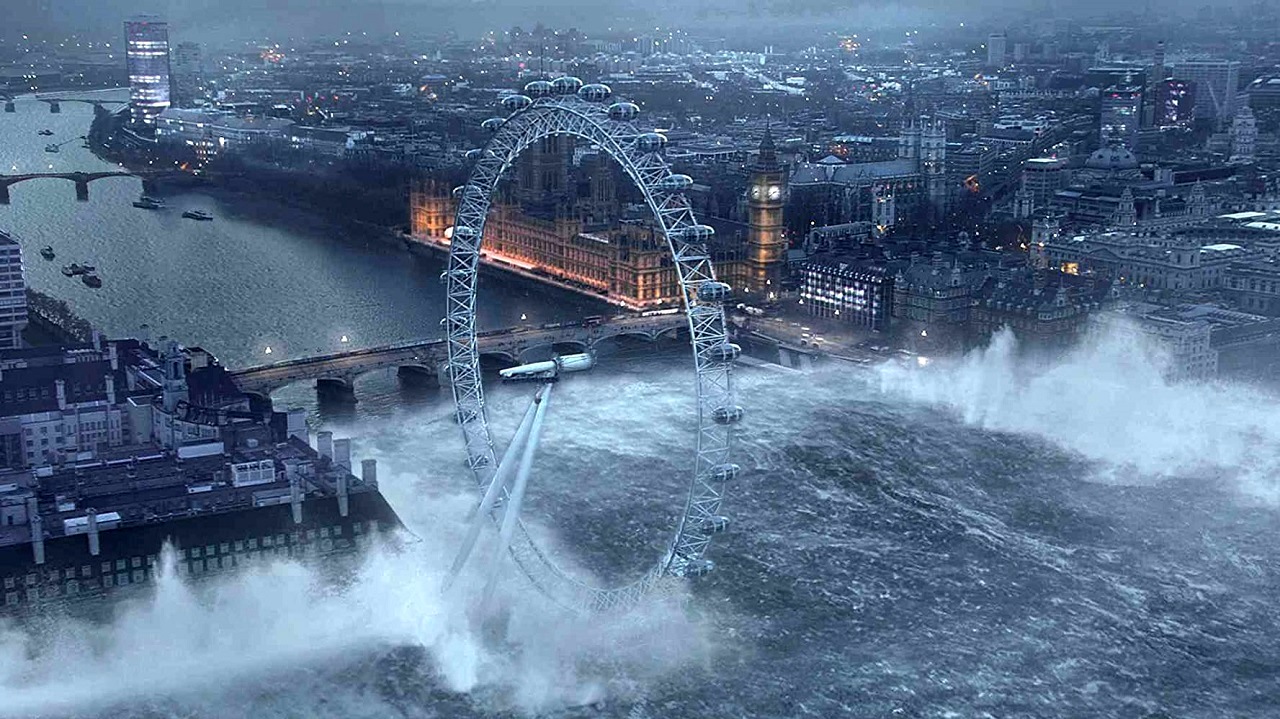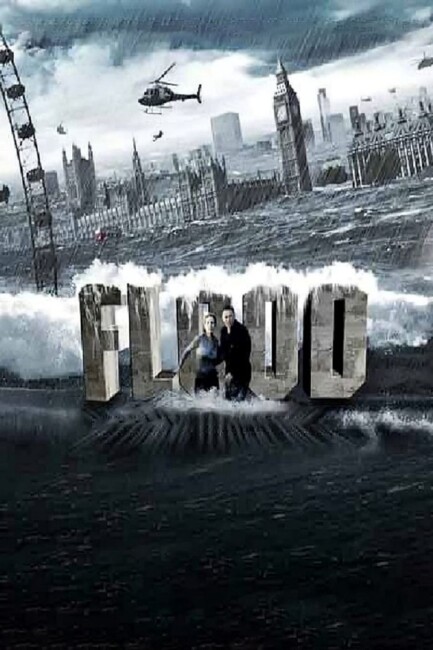Crew
Director – Tony Mitchell, Teleplay – Justin Bodle & Matthew Cope, Based on the Novel Flood (2002) by Richard Doyle, Producers – Justin Bodle, Genevieve Hofmeyr, Philip Key, Peter McAleese & Michael Prupas, Photography – Pierre Jodoin, Music – Debbie Wiseman, Visual Effects – Groupe Images Buzz, Production Design – Jonathan Lee. Production Company – Power/The Flood Productions Ltd/Moonlighting Flood Productions (DTV) Ltd/London Flood Productions Inc/Muse Entertainment Enterprises Inc.
Cast
Robert Carlyle (Rob Morrison), Jessalyn Gilsig (Sam Morrison), Tom Courtenay (Professor Leonard Morrison), Joanne Whalley (Commissioner Patricia Nash), David Suchet (Deputy Prime Minister Campbell), Nigel Planer (Keith Hoskins), Ralph Brown (Neil), David Hayman (General Ashcroft), Jade Davidson (Mel), Tom Hardy (Zak), Angus Barnett (Bill), Poppy Miller (Nikki Fuller), Pip Torrens (Army Liaison Officer), John Benfield (Frank)
Plot
The small town of Wick in Scotland is abruptly flooded by 52 foot wall of water. As emergency services and media congregate on the disaster, the Met Service monitors the storm, which has retreated out into the English Channel, but believes that there is little chance it will return inland again. Such is abruptly proven wrong as the storm turns towards London and moreover starts gaining strength. Emergency services are ill-prepared. Professor Leonard Morrison, who has been discredited because of his controversial theories about the Thames Barrier, fights to be heard with his warning that the Barrier will not be sufficient to prevent a flood of this magnitude from overwhelming London. He is proved correct as the flood hits and a vast wall of water sweeps through Central London. Morrison’s son Rob, a nautical engineer, and his estranged wife Sam, the controller at the Thames Barrier, are caught at the Barrier as the water hits. Everywhere people try to cope as the city is deluged.
It was Roland Emmerich’s big screen The Day After Tomorrow (2004) that inaugurated the environmental disaster movie. This was followed by various works, mostly for tv, such as Category 6: Day of Destruction (2004) and Category 7: The End of the World (2005) and a great many other cheap Syfy Channel meteorological science-fiction scenarios. (For a more detailed overview see my essay Disaster Movies).
The interesting new thing about these and Flood is that they are all disaster movies/mini-series based around an awareness and acknowledgement of global warming and climate change. Indeed, one makes the prediction that as global warming moves from a theory that is disputed for political convenience to one that is recognised as incontrovertibly true and the movement for action on carbon emissions reduction gains high priority worldwide, then environmental catastrophe scenarios will become one of the predominating science-fiction themes of the 2010s and beyond.
One looked forward to Flood‘s take on the environmental disaster movie as it was a (predominantly) British view on the formula. British television has a reputation of making works with class, wit, intelligence and a whole lot of things that the American networks by large don’t seem to get. Alas, such expectations are soon drowned and Flood turns out to only emulate the formula of its American models.
The plot never does anything more than wheel out the cliches of the disaster movie – a superstorm heading for a major population area; the authorities vastly underestimating the extent of the threat and/or covering up their own ineptitude and self-interest; a rogue scientist who is proven right with his theory that goes against the conventional wisdom; climactic scenes where lone heroes fight in a last ditch gamble to halt the disaster before military types take actions that could have drastic consequences.

The drama in Flood often feels contrived – lots of fast-paced crosscutting between different running dramatic threads. One of the worst parts is the tiresomely repetitive score that seems to be constantly trying to pump a dramatic urgency into everything that is happening. And there is never anything interesting or terribly engaging to the various dramas. Indeed, the second half of the four-hour running time seems to consist of nothing more than scenes of various people trying to deal with flooding in different locations – a parking garage, the tunnels beneath the London Underground, the tunnels beneath the Thames Barrier and so on – and Flood eventually becomes repetitive in all the running around. The actors only ever seem to be reacting to various masses of water sweeping towards them rather than delineating their characters.
Certainly, the digital effects that represent all the flooding are perfectly competent and there is the appealing novelty of seeing various London landmarks under water and being flooded. To its credit, the script at least attempts to grapple with more than the dramatics of flooding water and occasionally see the disaster in terms of its much wider sociological impact – the scarcity of drinking water, the overstretched emergency services or scenes where the commissioner has to make drastic decisions about which parts of the city to save and which to abandon, even in terms of the economic impact. The scriptwriters also show that they have done a commendable job in researching their meteorology and the causes and conditions of such a storm.
If nothing else, Flood does manage to corral an interesting cast, which includes an aging Nigel Planer, Neil the Hippie for those who remember that cult joy of 1980s television The Young Ones (1982-4), here playing a starchily serious Met Service bureaucrat; the very underrated Jessalyn Gilsig, who is never given much to do cast as a Canadian (which she is in actuality, no doubt because of Canadian co-financing deal) improbably in charge of the Thames Barrier. The best piece of casting that Flood manages is to bring back the lovely Joanne Whalley who has been absent from major screen roles for far too long a time and makes for an intelligent and serious-minded police commissioner.


